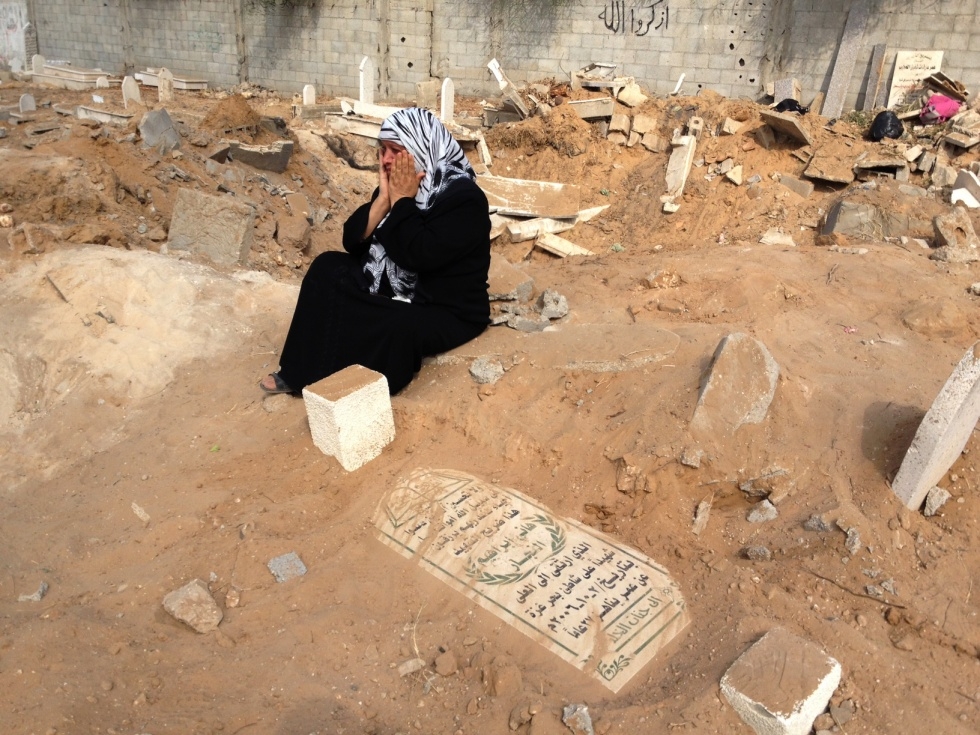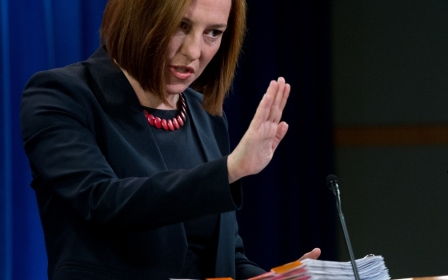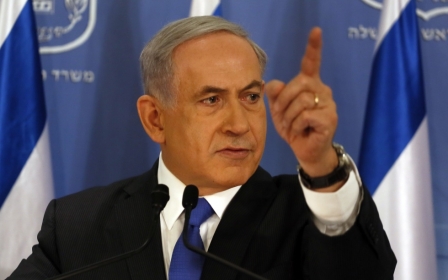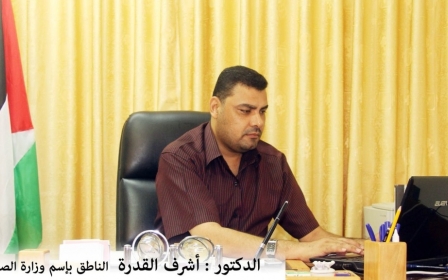In Gaza, even the dead get no peace

GAZA CITY- Her teardrops fall on the grave of her son - under a hot sun she starts shovelling the sand away from the grave area - yet she does not know if she will be able to find his exact grave.
The deeper 58-year-old Inshirah Al Najjar digs, the more she comes across the bones of dead bodies - she only hopes that these bones do not belong to the child she gave birth to.
“My heart was burning when my son came early this morning to tell me Israeli F16s had bombed the cemetery and Hani’s grave is missing,” she says, crying.
Al Najjar is the mother of a fisherman, Hani Al Najjar, who was 27 in 2006 when an Israeli gunboat killed him, while he was trying to catch fish to feed his family.
She continues to dig down, deeper into his grave, still crying - a mother coming here alone with Israeli warplanes dropping bombs overhead. Just some hours ago, the Sheikh Radwan cemetery was hit by missiles from Israeli jets.
Al Najjar digs deeper still, while another man from the Al Kateeb family comes to rebury the body of his relative, after approximately 20 grave sites were hit by Israeli missiles. The broken bones from the graves hit by Israeli missiles lie scattered around, and it is difficult for the relatives to determine which parts come from which grave.
The man standing nearby starts screaming, while holding a piece of skull by an eye socket - his loud cries of anguish can be heard across the cemetery, shouting back at Israel’s fighter jets for disturbing and abusing the graves, and bones, of the dead.
“These are our dead, why attack them again, why?” he says. “The bones were not firing rockets.”
Al Najjar has found someone to share her pain of looking for a family grave in the churned-up ground - a man whose anger goes beyond words - beyond stating that, “Israel has no civility and no respect for the dignity of the human body - alive or dead.
“This is the work of cowards who fear even the bones of human beings,” he declares out loud to the sky.
Al Najjar weeps as she eventually gets near the bottom of her son’s grave that has sustained so much damage. But she’s still not sure his bones are intact, among many others disturbed and scattered.
“I am a mother who loves her son and, although he may be dead, I will still protect his grave as any mother around the world would,” she says, breaking down in tears again.
Her son Ikrami came earlier to visit the grave of his brother to tell him how much he misses him - a habit he developed on each first day of Eid since Hani was killed. But this Eid, Ikrami did not find the grave - he ran away in horror on seeing the bones scattered on the ground, running to his mother, screaming about what he’d seen.
“The burning sadness I had in my heart is stronger than when I heard about his killing some years ago,” she says, trying to steady her voice.
Al Najjar says that Hani’s two children wanted to come to visit their father’s grave, as they had done so on every Eid since he was killed in 2006. But she did not want them to see the shattered grave of their father, or other graves around nearby.
“They would have been terrified and upset at what I have seen. I just couldn’t bring them,” she says
Sixteen-year-old Mohammed Khader, who lives nearby, witnessed the bombing. He works at the normally peaceful graveyard, where he tends the graves regularly.
He arrives today with some water to rinse the gravestones off and take care of flowers, so visiting families can enjoy fresh and clean graves on the first day of Eid.
“I don’t know how to tell people that the bones of their loved ones have been displaced by Israeli bombs,” he says.
Targeting the dead
Residents of the area say they have seen no fighters and know of no reason why Israel should target cemeteries and graves. Last week, the Roman Orthodox Church in the city centre reported that 15 Palestinian Christian graves were also damaged by Israeli artillery shells.
For the past four years, Khader has worked as a volunteer at the cemetery, tending the graves; sometimes getting paid by families to look after the gravesites.
“We need more stones to cover the bodies, but because of the war, people don’t know where to find them,” he says, holding on tightly to a yellow water container that he uses for washing the gravestones.
When the grave sites are bombed by Israeli jets, families in Gaza have no other option but to bury all the bones together, instead of going through the pain and trauma of sorting through them to identify individuals - male or female. In this case, the local resident who discovered the cemetery had been bombed decided to lay every scattered and shattered bone together in the same area.
Israel’s attacks on the gravesites have stirred much anger. Abu Suhaib, 46, is extremely upset: “To Israel, everything is a target; the gravestones, trees, living humans and now our dead.”
The first day of Eid is special to Palestinians who spend the day with their deceased loved ones - thousands made it here to Sheikh Radwan cemetery. And everyone is wondering why Israeli F16s should strike just before people flooded into the cemeteries to pay respects to the dead.
Abu Suhaib thinks the real aim is to intimidate and to instil fear in Palestinians, that whatever they do, wherever they go, they are a target for Israeli weapons.
“This is a pure form of terrorism - Christian and Muslim cemeteries are targets. Even the dead are Israel’s targets.”
Middle East Eye propose une couverture et une analyse indépendantes et incomparables du Moyen-Orient, de l’Afrique du Nord et d’autres régions du monde. Pour en savoir plus sur la reprise de ce contenu et les frais qui s’appliquent, veuillez remplir ce formulaire [en anglais]. Pour en savoir plus sur MEE, cliquez ici [en anglais].




